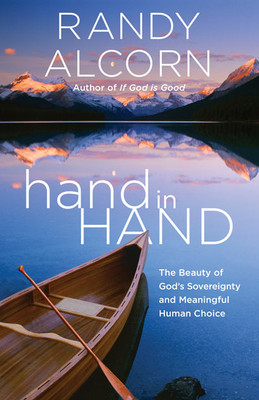These questions are from a recent interview with Jonathan Merritt about my book hand in Hand:
1. Christians have been debating God's sovereignty and humans' free will for centuries. What are you adding to the debate that is new?
I labored to be fair to each position, carefully avoiding misrepresenting them and turning them into easy-to-refute straw men. I avoided tilting the scales by selecting certain biblical passages while ignoring others that support or challenge either Calvinism or Arminianism. I included many sovereignty and many freewill passages.
This compels us to recognize there are two parallel lines that cross in God’s infinite mind, even if they don’t make sense to our finite minds. Accepting that God calls upon us to believe paradoxical (meaning apparently contradictory, not truly contradictory) ideas is key. That way we can place our faith in God rather than lose our faith or give up the discussion because we can’t figure out how to reconcile them.
I disagree with various ideas, but respectfully, suggesting they are based not on complete untruth but partial truths (which lead to partial falsehoods). I also include original charts and diagrams that I think will help readers understand the issues.
2. You've said the traditional approach to the debate isn't working. How so?
My approach is very respectful of opposing viewpoints which I believe fall within the bounds of Christian orthodoxy. I quote directly from Arminian and Calvinist scholars. I cite significant misrepresentations of Calvinism by Arminians and Arminians by Calvinists.
I tried hard, with critiques from both Arminian and Calvinist theologians, to state their positions as their proponents would. I show how each positon can be supported by some Scripture. But I tried to show the need to bring all Scripture to the table, and to embrace paradox rather than rejecting one position in favor of another.
I quote from Arminius who glowingly complemented John Calvin’s commentaries. I cite Calvinist Charles Spurgeon who expressed deep respect for Arminian John Wesley. I tell the moving story of evangelists Wesley and George Whitefield, whose beliefs once separated them, but who came to love and respect each other.
We wrote what I think are very helpful group discussion questions, designed so people with different perspectives could look at Scripture together and discuss these issues freely and respectfully.
 3. Why is the first "hand" in the title not capitalized while the second one is?
3. Why is the first "hand" in the title not capitalized while the second one is?
The lower case hand represents humanity while the uppercase Hand is the hand of God. God’s Hand controls far more than ours, and He can at any time tighten or loosen his grip. Our choices are important, but His choices are much bigger than ours simply because He is infinitely bigger than we are!
Calvinists may think hand in Hand sounds too much like the cooperative work of two equals, which glorifies man and insults God. Arminians may think it implies that human beings are like children, with the child’s “choices” basically controlled entirely by the parent. (However, the child holding her parent’s hand is still free to do things with her other hand!)
4. Why do you prefer "meaningful human choice" as opposed to "free will?"
I think “free will” can mislead, because there are any number of choices we can’t follow through on. For instance, I can freely choose to fly but if I step off the roof to try it I soon discover I simply don’t have the capacity to fly.
But what limits us much further is that we are not only finite, but fallen. In Scripture we see that our wills are in bondage because we have inherited sin natures going back to Adam. I am not free, for instance, to make choices that earn my way to heaven! I much prefer the term “meaningful human choice,” because even when our natures prompt us to make particular choices that may not be entirely “free,” they are nonetheless meaningful and consequential choices.
The book’s subtitle is “The beauty of God’s Sovereignty and Meaningful Human Choice.” I believe there’s great intrigue and wonder in these issues, which should lead us not to frustration but worship.
5. Some Christian leaders have suggested that some natural disasters were ordained by a sovereign God. How do you respond?
God didn’t create a world with natural disasters but both Calvinists and Arminians agree He allows them as part of the Curse. Scripture shows repeatedly that God is sovereign over all nature. Jesus said of his Father, “He causes his sun to rise on the evil and the good, and sends rain on the righteous and the unrighteous” (Matthew 5:45). Psalm 147:18 says of God, “He makes his wind blow.” Blowing winds would include hurricanes and tornadoes.
Job 37:13 says, God “brings the clouds to punish men, or to water his earth and show his love.” Numbers 11:1 says when Israel grumbled against God, “Then fire from the LORD burned among them and consumed some of the outskirts of the camp.”
So Scripture shows that some natural disasters are indeed from God’s hand. However, it’s wrong to view every natural disaster as a direct judgment of God on sin, since when Jesus spoke of the man born blind in John 9:3, He said the disciples shouldn’t conclude his blindness was God’s judgment on some specific sin by him or his parents.
6. Make this debate practical for me. If I am already a Christian, why do I even care?
If I don’t have the freedom to make meaningful choices, it changes the way I live. It makes me a hyper-Calvinist or a fatalist. It makes me irresponsible and indifferent to the need to make wise and righteous choices, because it’s all in God’s hands, and what I think and do won’t matter in the end.
Believing in God’s sovereignty is immensely practical because if I view my life as random and in the hands of evil people or demons, then they can ruin my life. But if I accept that God is sovereign and that He promises to work all things together for good for those who love Him, then I have confidence that though my own choices are very real and important, at the same time my life is in infinitely bigger Hands than my own.





